More Hofstra photos are coming soon. Before I get to those, here's an image from my drive home from O'Hare this afternoon. It's the last Cabrini Green high-rise in its death throes:
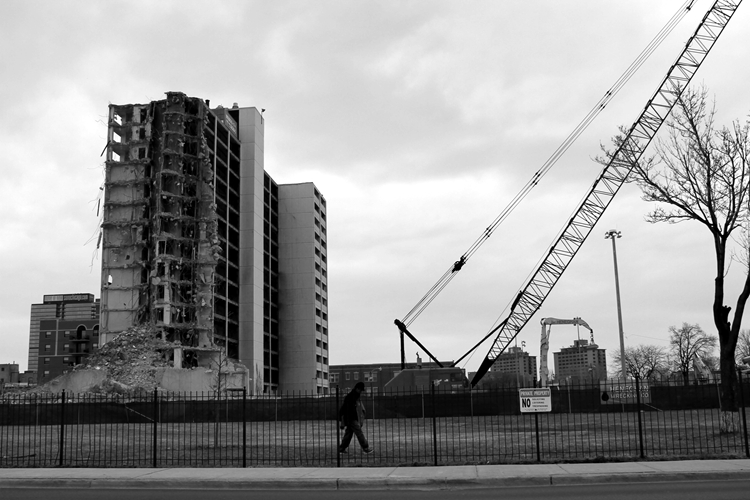
The site, on Division between Halsted and Larrabee, contained the last two high-rises of a blighted urban complex that covered over 2.5 sq km and had some of the worst crime in the city. The Encyclopedia of Chicago describes the history:
The large new apartments and large swaths of recreation space failed to mend the area's poverty. The difficulty blacks had finding better, affordable housing gave Cabrini-Green a permanent population. CHA failed to budget money to repair buildings and maintain landscaping as they deteriorated. Cabrini-Green's reputation for crime and gangs rivaled Little Hell's. The murders of two white police officers in 1970 and of seven-year-old resident Dantrell Davis in 1992 drew national attention.
Increasing real-estate values in the late twentieth century led housing officials to propose replacement of the complex with mixed-income housing. Residents argued however that such a move would displace them permanently, completing the slum removal effort begun with the building of Cabrini Homes half a century earlier.
Those "increasing real-estate values" mean that you can now spend $500k on a townhouse in the former no-go zone around Wells and North, and the Cabrini-Green site could wind up selling for many tens of millions. And if you're wondering what happened to all the project's residents, you're not alone.
I visited my alma mater for a reunion of Chronicle alumni today. I think I last saw the campus in 1999, though I might have seen it as late as 2003, but it doesn't seem that recent. No matter; except for a couple of buildings that sprouted from the North Campus parking lots, everything looks just enough like it did when I lived on campus that I feel vaguely weirded out right now. Walking into the Chronicle office, which looks pretty much the same (except with bigger computers and younger editors), made me remember so many Wednesday night layout sessions that I felt a residual wave of sleep deprivation wash over me.
Only a few people from my era came to the reunion. I blame, in no small part, the Alumni College for not reaching out to more alumni. The Chronicle invited one of my classmates to speak on a panel months ago, but he didn't receive his invitation from the alumni office until two weeks ago. A few other people I emailed didn't know anything about the event.
I didn't take enough time to shoot everything I'd hoped to, and some of the things I wanted to photograph have disappeared or moved (like the WRHU offices, which now live in their own special annex of the TV building instead of the basement of Memorial Hall as I remember them). As I offloaded the photos I realized I'd taken shots of the most evocative parts of campus to me, even though they'll look completely banal to anyone else. For example, I have two shots of a particular stairwell—the one leading from the Student Center Atrium down to what used to be the Small Clubs Offices—because seeing it brought back such an overload of memories.
Anyway, here are two less-banal shots. First, the library, which has a new extension, but otherwise looks the same as it did when it opened in the 1950s:
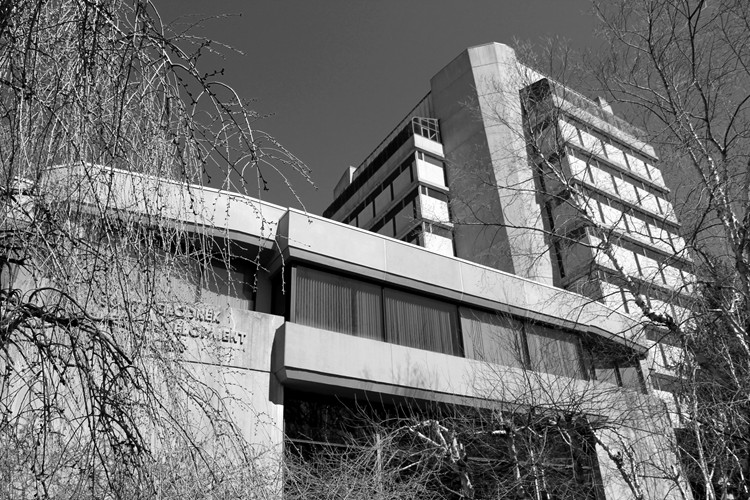
This, also, hasn't changed since 1960, if I have my information right:
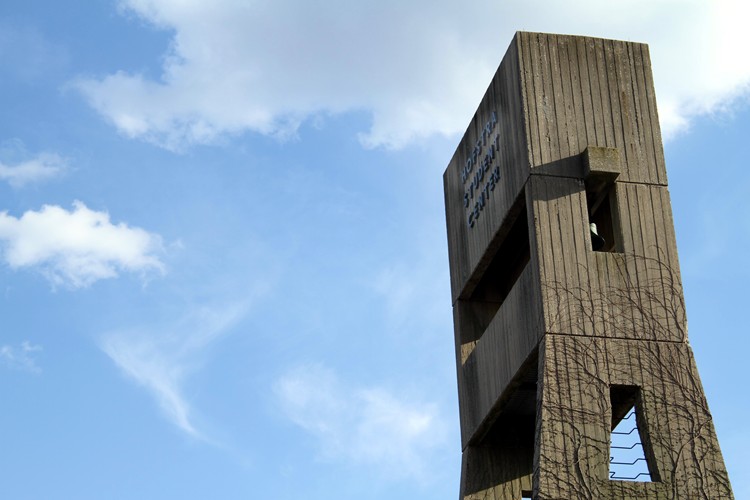
There is no reason for this post beyond the obvious:
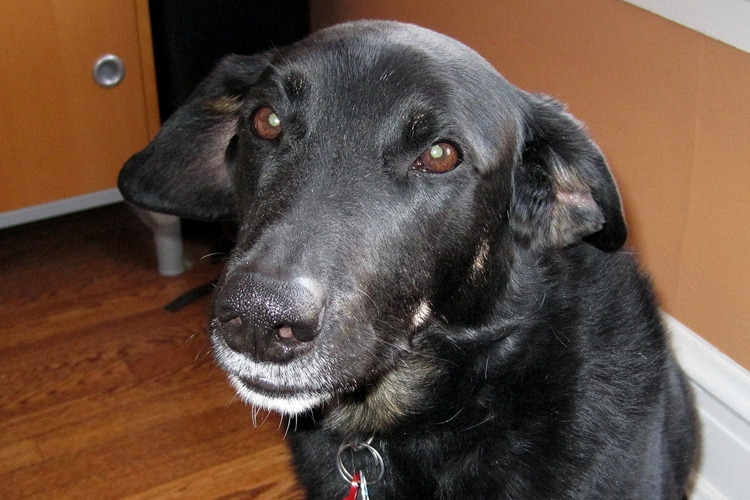
Someone has put something in the water today. News organizations seem to have made some surprising discoveries today:
Oh, wait—that last one is real. It's still a foolish story.
I'll post more throughout the day as I discover them.
Via Gulliver, Air New Zealand has a new safety video, which isn't quite up to the bar set by their previous one:
Youtube contributor hatinhand has compiled 71 movie spoilers:
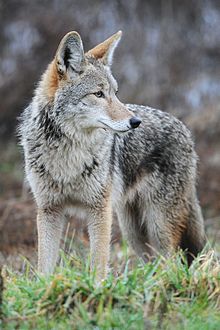 The Chicago Tribune reported today that coyotes living on the North Side sing along to ambulance sirens:
The Chicago Tribune reported today that coyotes living on the North Side sing along to ambulance sirens:
In a posting on his website, Ald. Patrick O'Connor, 40th, says many residents near the hospital have reported seeing coyotes. Additionally, residents have reported hearing what sounds like a chorus of coyotes howling in response to ambulance sirens.
Coyotes vanished from the Chicago area by the end of the 19th century, but they've made a comeback in recent years.
Alderman O'Connor says the coyotes live in nearby Budlong Woods, which is great for them but not so good for outdoor cats:
Small animals can easily become coyote prey even in fenced yards so keep an eye on your pets while they are outside the home Though coyotes generally hunt between sunset and sunrise, they can be observed at all hours of the day and night. The City does not trap or disable coyotes and encourages extreme caution upon encountering one.
I live close enough to the Lincoln Park Zoo that I can sometimes hear the wolves howling. They're not technically urban wildlife if they're in the zoo, but Parker doesn't know that, and their howling freaks him out.
Photo: Wikipedia
Reader DM commented on yesterday's lament about Inbev acquiring Goose Island Brewery:
This is definitely not a good thing, but I don't think it's nearly as bad as people are making it out to be. The brewpubs are reported not to be in the deal (I'm not sure how that is), but that is what I've read.
They are also bringing in Brett Porter to run things, who is a pretty good brewmaster from Dechutes Brewery out in Oregon. I've have a few of their brews and they are pretty good.
It makes absolutely no sense for AB to change the beers or water them down. In doing so they will lose the customers they currently have. Let's face it, the people that drink Goose Island will notice a difference if they begin to drop the quality and turn it into a Bud Light Wheat. And there is no way they will pick up the Bud Light drinkers of the world in doing so.
I think what is more likely is that we might see some of the less profitable beers dropped from production and they will start to push the more profitable beers like 312 and Honker's Ale. Hopefully they'll continue some of their more complex beers like Bourbon County Stout, Sofie, Matilda, Green Line and the IPA.
I'm in no way advocating this change. Having a great indie craft brewery sell out to one of the big beer corporations is never a good thing. I just don't think it will be nearly as bad as most think. At the very least we need to wait and see what happens. I guess if they do change things for the worse there is always Half Acre, Metro, Haymarket, and Revolution brewery for Chicago craft beer drinkers.
Still, I think we may have seen the last of the cask-conditioned ales. And will I still have MBA (Master of Beer Appreciation) privileges at the brewpubs? Will I want them?
More on Anheuser-Busch's sad acquisition of Goose Island Brewery. First, Brewmaster Greg Hall told the Tribune about the trouble he's seen:
In an interview with the Tribune last month, brewmaster Greg Hall said the company’s sales had “outpaced our forecast in 2010, so that we weren’t quite ready for all of the growth we got.” Goose Island also hired an investment banker to assist the family in securing funds for expansion.
Although the Craft Brewers Alliance’s 2006 investment in Goose Island has technically exempted the brewer from craft-beer status, the company’s popular brands have shared the problem of other craft beers: increasing capacity to meet surging demand.
Goose Island is best-known for its 312 Urban Wheat Ale, and respected in craft circles for other products like Matilda and Bourbon County Stout. Goose Island has been outsourcing some production and seeking additional investment to expand capacity.
And Chicago Public Radio had some local bar owners on to wring their hands:
[B]ar owners like Phil McFarland, who runs Small Bar in Chicago's Ukranian Village neighborhood, said he's conflicted about the merger.
"I don't guess that Anheuser has bought them to make Budweiser knock offs and part of the appeal of a brewery like Goose Island is that they have the recipes they do that have the, sort of, respect in the market that they have and from a business point of view, I would have to think they'd be sort of crazy to mess with that too much, but time will tell," McFarland said.
Meanwhile, Chris Staten, the Beer Editor of Draft Magazine, said the acquisition shows Anheuser's further commitment to the craft brew market.
In other words, this is a classic "bookend" story. Goose Island has already become a major beer producer, no longer really a craft brewery, so no one can really do more than shrug. And Inbev, which owns Anheuser-Busch, is too big and stupid to make their own beer up to Goose Island's quality, so they just figured they'd buy the place. Hey, big companies buying small companies happen every day; what could go wrong?
Four years after starting a distribution deal, Goose Island Brewery announced today that they've sold out completely to the megabrewery:
Goose Island Beer Co., the Chicago-based brewing powerhouse, announced this morning that it will be taken over by Anheuser-Busch.
Brewmaster Greg Hall will be stepping down.
Can't imagine why:
Anheuser-Busch reached an agreement to purchase the majority (58 percent) equity stake in FSB from its founders and investors, held in Goose Holdings Inc. (GHI), for $22.5 million. Craft Brewers Alliance Inc. (CBA), an independent, publicly traded brewer based in Portland, Ore., that operates Widmer Brothers, Redhook and Kona breweries, owns the remaining 42 percent of FSB and reached an agreement in principle to sell its stake in FSB to Anheuser-Busch for $16.3 million in cash. Anheuser Busch holds a minority stake (32.25 percent) in CBA.
Goose Island sold approximately 127,000 barrels of Honkers Ale, 312 Urban Wheat Ale. Matilda and other brands in 2010. To help meet immediate demand, an additional $1.3 million will be invested to increase Goose Island’s Chicago Fulton Street brewery’s production as early as this summer.
"Demand for our beers has grown beyond our capacity to serve our wholesale partners, retailers, and beer lovers," said Goose Island founder and president John Hall, who will continue as Goose Island chief executive officer. "This partnership between our extraordinary artisanal brewing team and one of the best brewers in the world in Anheuser-Busch will bring resources to brew more beer here in Chicago to reach more beer drinkers, while continuing our development of new beer styles. This agreement helps us achieve our goals with an ideal partner who helped fuel our growth, appreciates our products and supports their success."
This means the Goose Island brewpubs will become Applebee's but brew Bud Light on-site. And with increased production, Goose Island beers will have to lose complexity and quality to compensate for larger batch sizes. But hey, $16.3m is a fair pile of cash. And Tyranena isn't too far.
Still, I'll miss the great beers.